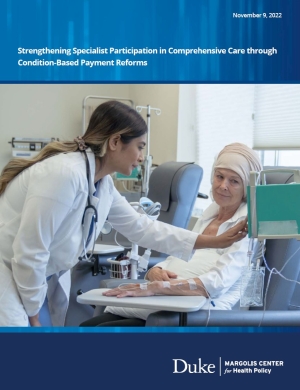
Policy Brief
Strengthening Specialist Participation in Comprehensive Care through Condition-Based Payment Reforms
Published date
Topics
EXECUTIVE SUMMARY
Efforts to implement comprehensive care models linked to improving health at the population level and lowering total cost of care are gaining momentum, with the Center for Medicare and Medicaid Services (CMS) setting a goal of enabling all Medicare beneficiaries and the vast majority of Medicaid beneficiaries to participate in accountable care relationships by 2030. Greater specialist engagement is critical for achieving this goal, given the vital role of specialist care in preventing and treating potentially serious health conditions. To date, though, payment reforms to support better specialty care have focused on acute events and major procedures, representing a limited component of specialists’ impact on the patient care journey.
Longitudinal payment reforms with accountability for improving outcomes and lowering costs currently support many primary care practices in building comprehensive care models that feature diverse care teams, expanded data infrastructure, and patient supports. Furthermore, chronic conditions where specialists play a critical management role– including cardiovascular, musculoskeletal, respiratory, cancer, neurodegenerative conditions, and behavioral health – account for most Medicare spending and could benefit from similar approaches. For example, a 10% reduction in procedures and hospitalizations for just cardiac and musculoskeletal care from better condition management would reduce total Medicare spending by more than 2%.
Specialty Condition-Based Payment Models (SCMs) are condition-level payments for specialized care that could be “nested” within population-based payment models such as accountable care organizations (ACOs). Payments would be designed to support longitudinal condition management, coordination, and services to prevent costly complications, allowing for flexibility in amount and risk to facilitate a range of primary-specialty alignment approaches. The shift to SCMs would be mandatory for hospital-led ACOs, which already have well-developed relationships with specialists, and voluntary for physician-led ACOs and providers in advanced payment models. Advancing a complementary set of four policy reforms would help support SCMs:
- Fee-for-service (FFS) payment changes to align with the goal of better condition management and to support specialist transitions to comprehensive care;
- Acute episode bundled payments aligned with SCMs, potentially including a transition to mandatory bundled episode payments for major procedures and acute hospital events;
- More timely data sharing, including condition-based performance metrics for common specialty care conditions, and implementation of patient-reported outcome measures; and
- Aligning SCM payment reforms in Traditional Medicare with steps across Medicare Advantage and other payment systems to provide complementary
- supports for specialist participation in comprehensive care.
Overall, these steps would enable significantly greater specialist engagement in comprehensive care models, account for differences in capabilities across primary and specialty care practices, and advance a more integrated, person-centered approach to improving health.
Click here to download the full version of the report or, alternatively, you can find a summary fact sheet of the report here.
Duke-Margolis Affiliated Authors

Mark McClellan, MD, PhD
Director of the Duke-Margolis Institute for Health Policy
Robert J. Margolis, MD, Professor of Business, Medicine and Policy
Margolis Executive Core Faculty